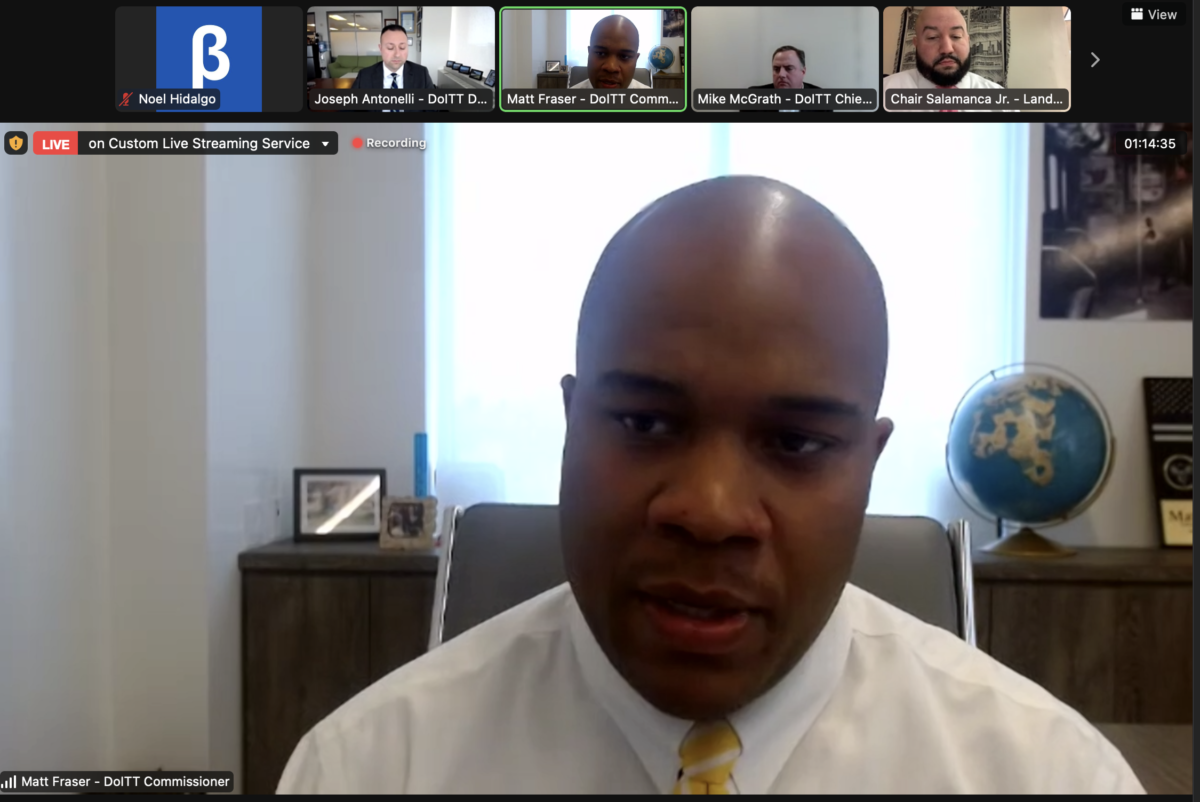To: NYC Council – Committee on Technology
From: Noel Hidalgo, Executive Director of BetaNYC
Re: Written testimony for DoITT / OTI Budget Hearing
Wednesday, 23 March 2022
Dear Chair Gutiérrez and fellow Council members,
For the last eight years, BetaNYC has called for a realignment of municipal technology services. We are glad to see Mayor Adams take the initiative to start this process. We have high hopes for Chief Technology Officer Fraser and the whole Office of Technology and Innovation.
At the start of this month, we celebrated the 10th anniversary of the City’s open data law. For the first time since the passage of this groundbreaking law, the complete open data team sat together. No longer was there a division between DOITT resources and Mayor’s Office resources. This de-siloing is exactly what we have wished for.
We hope this type of unity is the norm, and wish the Chief Technology Officer Fraiser and DoITT / OTI staff a swift and effective unification.
Our following testimony is informed by failures before and during the pandemic. As we have yet to see a detailed breakdown of the reorganization and 2023 OTI budget, our testimony will focus on core values and key questions to guide the budgeting process.
Core Values:
The pandemic exposed all New Yorkers to the fact that service design and user experience are not at the forefront of municipal service delivery. Moving forward, OTI should adopt NYC Opportunity’s service design principles to ensure that government services, including digital services, meet the needs of all New Yorkers.
The five core principles:
- Created with the people who use and deliver them
- Prototyped and tested for usability
- Accessible to all
- Equitably distributed
- Rigorously tested and evaluated for impact and effectiveness
Questions to move us forward:
The pandemic once again highlighted a broad need for modern technology services and a desperate need to bake service design into all aspects of operations. We need municipal service designers, user experience designers, and government services to meet New Yorkers where they are. Right now, there continues to be a disconnect on how services are delivered.
Supporting Community Boards
For four years, we have detailed Community Board needs. Community Boards need updated websites, constituent / issue tracking databases (CRMs), in-office technology, digital and data literacy, and, now, easy to use virtual meeting software and hardware.
How much of this budget and OTI’s reorganization is dedicated to increasing support for Community Boards and their needs?
Cloud Hosting
Over the past few years, DOITT has experimented with supporting cloud hosting platforms. It even made an emergency service contract with IBM for cloud hosting. Where does OTI stand when it comes to virtual machine hosting? How is OTI developing support for agencies to use virtual machine services?
How is OTI coaching agencies to adopt new cloud based computing platforms to minimize the cost of running hardware?
Open Source
Open source software practices have proven to be cost effective practices. What is OTI doing to make sure all agencies know how to leverage and develop these practices?
Service Design
How is OTI planning on working with NYC Civic Service Design studio to ensure that NYC’s services are designed with the broad needs of New Yorkers?
When it comes to supporting new agency services, how is OTI establishing a culture of effective service design and delivery?
Will OTI be hiring service designers?
Procurement Reform
The prior DOITT Commissioner halted the development of the Government x Design Citywide Design Services (GxD) RFP. This framework had the promise of giving agencies greater flexibility in developing and delivering new services. Why was this process canceled? What efforts are in place to ensure that agencies are guided through modern design / procurement practices that meet the needs of all New Yorkers, not just the ones who can figure it out?
Talent Development
Within the current budget, how much is dedicated to modernizing existing talent and practices?
How is OTI leveraging its relationship with CUNY to ensure a modern talent pool is coming into the agency? How much of this budget is dedicated to those efforts?
What efforts are being made to work with the City’s technology and design community? How much of this budget is dedicated to those efforts?
Accountability of Algorithms
In the Executive Order creating OTI, the Mayor’s Office of overseeing algorithmic accountability was folded into OTI. Additionally, the role of the Algorithmic Accountability Officer, Algorithms Management Steering Committee, and Algorithms Advisory Committee were abolished. How are these responsibilities being rethought and when can the public expect the same level of accountability?
